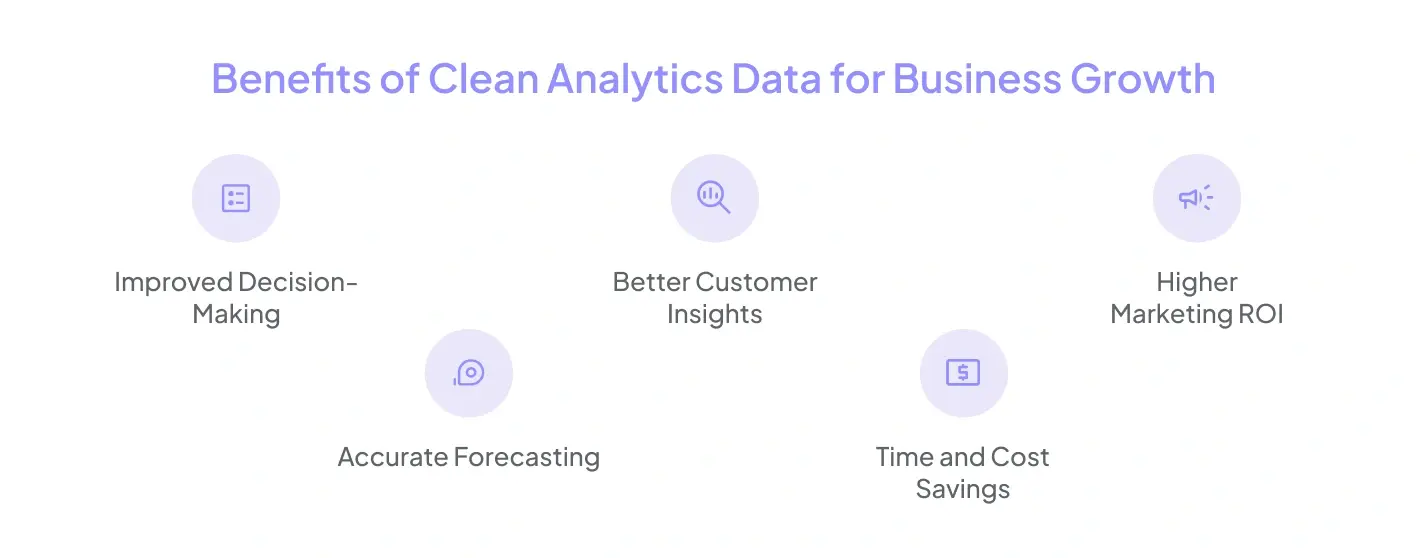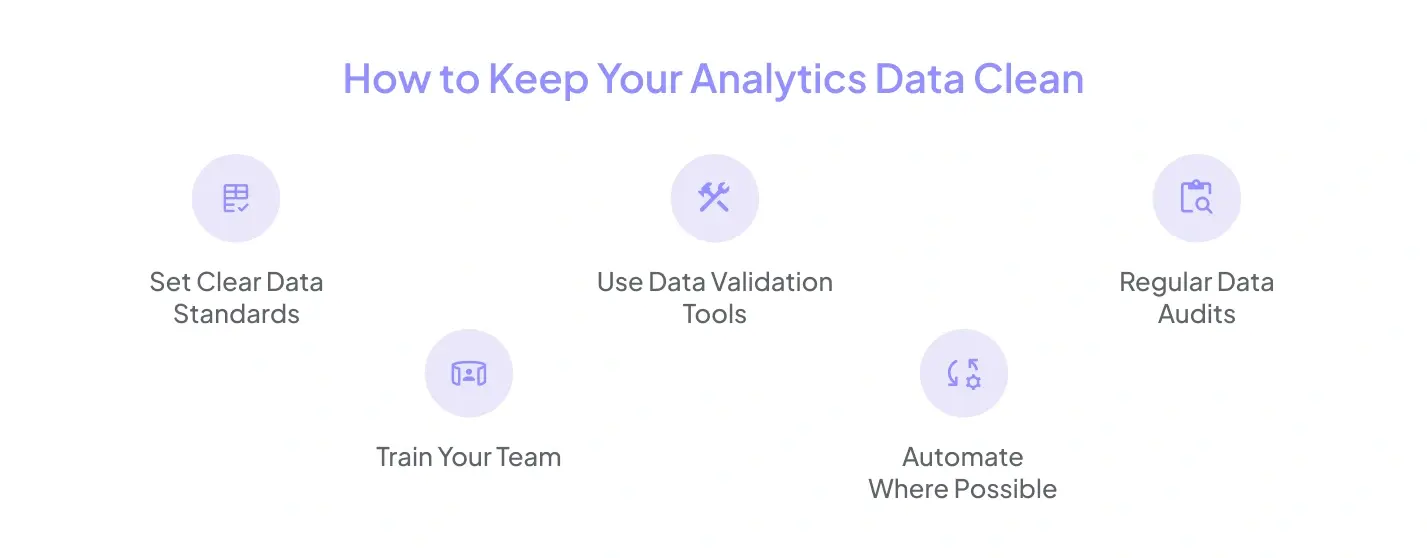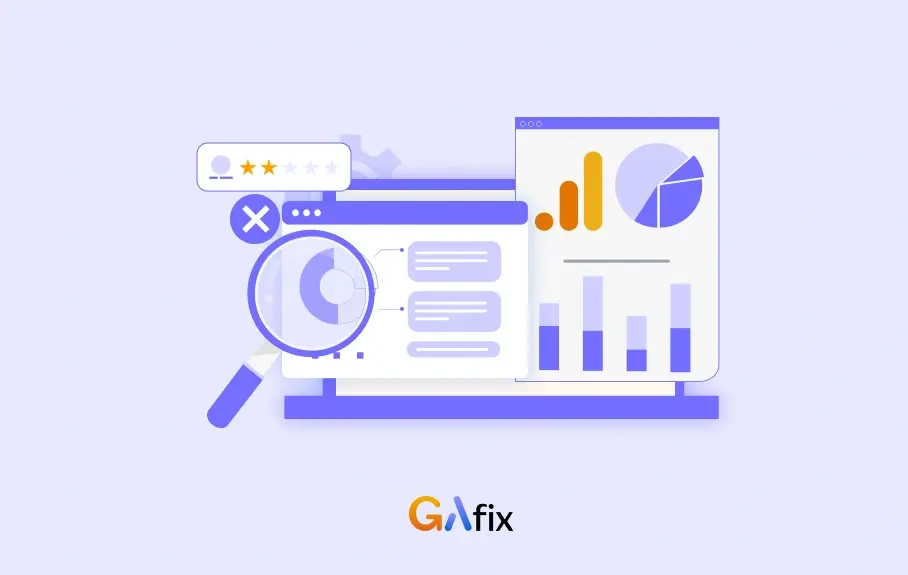
Modern businesses thrive on data to shape strategies and stay ahead of the competition. However, not all data is created equal. If the data you use is full of errors, duplicates, or inconsistencies, it can mislead your business rather than guide it. This is where data cleansing (also known as cleansing data or the cleansing process) becomes crucial.
Clean data means your analytics information is accurate, reliable, and free of unnecessary clutter. Let’s explore why clean analytics data is so important and how the data cleansing process can help your business grow.
Why Clean Analytics Data Matters
Analytics is only as good as the data behind it. If your data is messy, your reports, dashboards, and insights will be misleading. For example, imagine tracking website visits but counting the same visitor multiple times due to duplicate entries. Your data would show higher traffic than reality, leading to incorrect marketing decisions.
Cleanse data to ensure your business decisions are based on facts, not assumptions. This will help you see a clear picture of your performance and identify the right opportunities for growth.
Benefits of Clean Analytics Data for Business Growth

Clean analytics data is like having a crystal-clear lens to view your business performance. It eliminates confusion caused by duplicates or incorrect entries and ensures that every insight you gather is accurate and actionable. Here’s how clean data drives business growth:
1. Improved Decision-Making
When your data is accurate, your decisions are based on real customer behaviors and market trends. You can confidently invest in campaigns that are working, reduce spending on those that aren’t, and discover new opportunities.
2. Better Customer Insights
Clean data helps you understand your customers more clearly. Cleansing data makes it easier to see who they are, what they like, and how they interact with your business, helping you personalize marketing efforts and build stronger relationships.
3. Higher Marketing ROI
Marketing budgets can easily go to waste when based on faulty data. By cleansing your data, you ensure every marketing dollar is spent effectively. You can track which campaigns bring the most leads or sales and double down on what works best.
4. Accurate Forecasting
Forecasting sales, demand, or revenue becomes much more accurate when your data is clean. You can trust your projections and plan better for future growth.
5. Time and Cost Savings
Messy data means your team spends hours fixing errors or sorting through irrelevant information. With clean analytics, you save time and reduce costs, as your employees can focus on strategic tasks rather than manual corrections.
How to Keep Your Analytics Data Clean

Maintaining clean data is not a one-time activity; it’s an ongoing process that requires attention and the right tools. By building a structured approach, you can ensure that your analytics always remain reliable and useful. Here are some ways to keep your data clean:
1. Set Clear Data Standards:
Define how data should be collected, formatted, and stored. For example, ensure that customer names and email addresses are always entered correctly.
2. Use Data Validation Tools:
Leverage tools that automatically detect duplicates, missing fields, or invalid entries in your data.
3. Regular Data Audits:
Schedule routine checks to find and fix issues before they affect your analysis.
4. Train Your Team:
Make sure everyone who handles data understands the importance of accuracy and follows best practices.
5. Automate Where Possible:
Automation tools can clean and organize data faster and more accurately than manual methods.
Real-World Proof: How Clean Data Drives Growth
You don’t have to take our word for it; research shows that improving data quality ties directly to better business outcomes: hitting goals, driving repeat sales, improving retention, and protecting marketing ROI. Here are a few credible, data-backed examples you can reference in your blog.
1. Better Data Quality = Better Business Performance
Experian’s Global Data Management research found that 75% of businesses that improved their data quality exceeded at least one of their annual objectives, including customer experience and revenue-related goals. The same research highlights that contact data is critical for customer engagement and that inaccurate data held companies back during rapid market change, a clear link between data hygiene and agility.
2. Data Quality Improves Agility and Customer Connection
In a 2024 Experian Data Quality article for direct‑to‑consumer (DTC) brands, business leaders reported that implementing data quality practices improved business agility and that validating email and address data helps reduce operational costs while strengthening customer relationships. Clean, enriched customer records make targeted marketing and personalization possible, key levers for growth.
3. Unified Customer Data Lifts Conversions
When HABA FAMILYGROUP broke down data silos and built a single customer view using a customer data platform, its JAKO-O brand ran a first‑time buyer re‑engagement program that delivered an 81% uplift in conversion and a 27% increase in click rate over a three‑month optimization period. Cleaner, connected data enabled smarter segmentation and personalized follow‑ups that led to more repeat purchases.
4. Customer-Obsessed Firms Grow Faster, And Retain More Customers
Forrester’s 2024 US Customer Experience Index shows that customer‑obsessed organizations report 41% faster revenue growth, 49% faster profit growth, and 51% better customer retention than non‑customer‑obsessed peers. Achieving that level of customer obsession depends on trustworthy, unified data that accurately reflects customer behavior across channels, yet another reason to keep analytics data clean.
5. Bad Data Wastes Money
Gartner research estimates that poor data quality costs organizations an average of at least $12.9 million per year, once you account for operational rework, lost opportunities, and downstream decision errors. Preventing those costs starts with upfront validation, deduplication, and governance across your analytics data sources.
6. Email Data Hygiene Protects Marketing ROI
Experian reports that invalid or mistyped email addresses inflate bounce rates, harm sender reputation, waste campaign spend, and skew engagement analytics, eroding marketing ROI. Verifying emails at the point of capture and cleaning your list regularly improves deliverability, engagement, and the data quality feeding your performance dashboards.
Final Thoughts
Clean analytics data is like having a clear roadmap for your business. It lets you make confident decisions, improve customer experiences, and boost profits. While collecting data is easy, maintaining its quality requires ongoing effort. But the payoff, better insights, improved ROI, and faster growth, is worth it.
If you haven’t started focusing on data cleaning, now is the perfect time. Your business growth depends on the clarity and accuracy of your data.

Frequently Asked Questions
What does "clean analytics data" mean?
Clean analytics data refers to information that is accurate, complete, and free from errors or duplicates. It ensures that every data used for reporting and analysis is reliable, allowing businesses to make confident and informed decisions.
Why is clean data important for business growth?
Clean data eliminates confusion caused by inaccurate insights. It helps businesses understand customer behavior, improve marketing campaigns, forecast sales accurately, and reduce wasted resources. Essentially, clean data acts as a strong foundation for creating strategies that lead to growth.
How often should businesses clean their data?
Data cleaning should be an ongoing process rather than a one-time task. Regular audits, monthly, quarterly, or whenever new data is added, ensure that analytics remain accurate and relevant. Automating the cleaning process using data validation tools can also help maintain data quality consistently.
Confident Decisions Start with Accurate Analytics
Ensure your GA4 is correctly configured, reliable, and ready for scale.

















